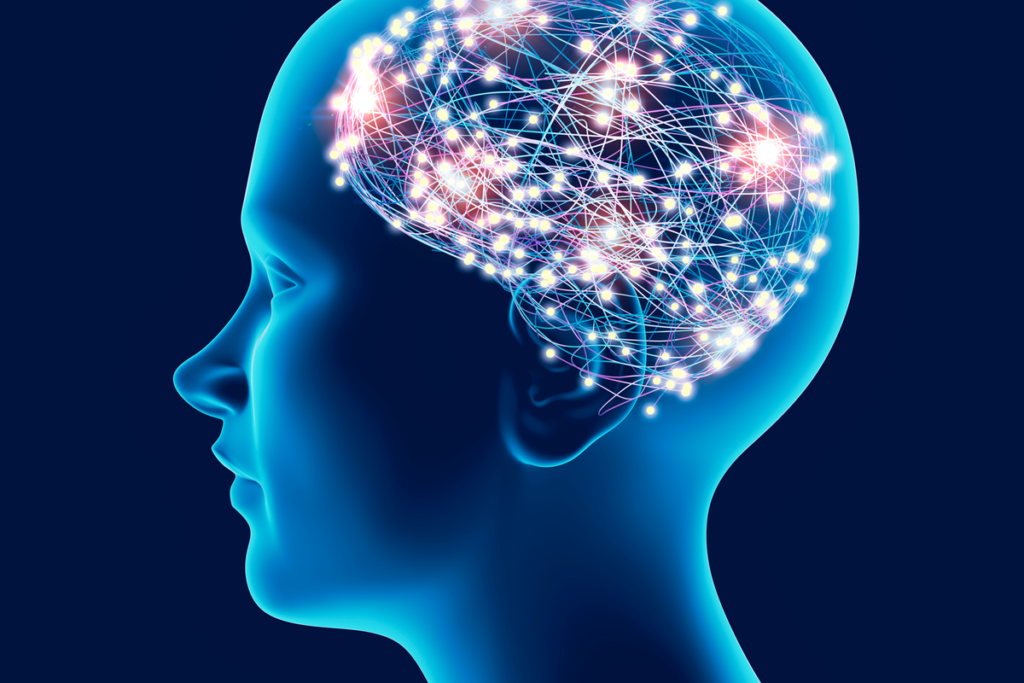Cognitive Impairment in Migraine Sufferers


Written and verified by the psychologist Valeria Sabater
Cognitive impairment in migraine sufferers is a phenomenon with a good body of evidence to support it. During these painful and annoying attacks, changes occur at the brain level. They cause dysfunctions in attention and concentration. Moreover, thoughts slow down, causing memory failures.
These are mild alterations and are almost always temporary. However, it’s common for many migraine sufferers to complain of cognitive deficits. This encourages them to adopt more therapeutic strategies which offer them a better quality of life.
Attention and executive function are the two processes most affected during migraines.
Cognitive impairment in migraine sufferers
As a rule, any feeling of discomfort can be a distraction that impairs cognitive performance. This makes everyday tasks such as studying, concentrating, or solving problems difficult. However, studies such as those published in the journal Dementia y Neuropsychologia highlight that migraine sufferers exhibit slight alterations in the kinds of tasks where various cognitive processes come into play.
Often, people who’ve suffered from migraine for years experience memory and attention failures. These are almost always temporary episodes and are linked to the period of time of the attack. However, science is also concerned with determining whether these could have a long-term effect.
People with chronic migraine and those who suffer frequent attacks are at higher risk of permanent cognitive decline.
Associated causes: electrical disturbances in migraine
Cognitive impairment is more common in chronic migraine sufferers. Analyses such as those conducted by the Institute of Experimental Neurology, Milan (Italy) highlight that this condition exhibits functional and structural alterations in various cortical and subcortical areas of the brain.
In addition, electrical dysfunctions often appear such as cortical spreading depression (CSD). This causes great sensitivity to external stimuli and problems focusing attention.
The abnormal electrical activity parallel to the migraine makes it difficult for the cerebral cortex to carry out tasks such as concentration and decision-making, among others.

What cognitive functions are affected?
The cognitive processes that are most affected during a migraine attack are attention and executive function. These are extremely critical areas for daily performance. As a rule, a migraine attack will affect the following processes:
- Learning.
- Drawing up plans.
- Verbal memory.
- Taking decisions.
- Analyzing information.
- Troubleshooting.
- Emotional regulation.
- Self-control processes.
An investigation conducted by the University of Lisbon (Portugal) claims that when patients experience a migraine attack without aura, these cognitive alterations are reversible. The problem arises in sufferers of chronic migraines with auras.
Cognitive impairment: reversible or permanent?
Data suggests that the majority of people show temporary and reversible dysfunctions. However, chronic migraine sufferers who experience frequent attacks have a greater risk of suffering long-term disorders.
A 2022 study published in The Journal of Headache and Pain claims there’s a significant association between migraine, cognitive impairment, and the risk of developing some type of dementia in the future.
This is the first meta-analysis to demonstrate such data. Therefore, more work would be required to claim solid evidence of such a claim. These kinds of explorations stress the need for neurology departments to pay more attention to the cognitive processes of migraine sufferers in order to prevent possible deterioration over the years.

What can be done to prevent cognitive alterations in migraines?
Migraine is an extremely complex clinical reality with many needs. The main objective isn’t only to reduce pain but to preserve brain health and the correct functionality of its processes. Therefore, it’s important that new therapeutic and approach mechanisms be developed.
However, cognitive impairment in chronic migraine sufferers and frequent attacks are more worrisome. In these cases, adequate psychological and neurological evaluations are recommended to detect any possible permanent deterioration. It’s necessary to ascertain if these failures happen only during migraine attacks or if they occur on a daily basis.
Advice for frequent migraine sufferers
- Find the best drug treatment to reduce the pain.
- Introduce psychological therapies that improve the quality of life. Include techniques to manage stress, promote relaxation, and manage emotions.
- Cognitive stimulation programs
- Consider other comorbid conditions. For instance, often, a depressive disorder can affect the sufferer’s cognitive performance.
- Taking care of diet. Foods that are rich in amines often trigger migraines. In fact, a study published by the Spanish Journal of Community Nutrition explains that biogenic amines can have a vasodilator effect that leads to discomfort.
As a rule, experiencing these events only during attacks is completely normal and doesn’t have long-term effects. If you’re a migraine sufferer and experience memory lapses and/or attention problems long after a migraine, consult your doctor.
Cognitive impairment in migraine sufferers is a phenomenon with a good body of evidence to support it. During these painful and annoying attacks, changes occur at the brain level. They cause dysfunctions in attention and concentration. Moreover, thoughts slow down, causing memory failures.
These are mild alterations and are almost always temporary. However, it’s common for many migraine sufferers to complain of cognitive deficits. This encourages them to adopt more therapeutic strategies which offer them a better quality of life.
Attention and executive function are the two processes most affected during migraines.
Cognitive impairment in migraine sufferers
As a rule, any feeling of discomfort can be a distraction that impairs cognitive performance. This makes everyday tasks such as studying, concentrating, or solving problems difficult. However, studies such as those published in the journal Dementia y Neuropsychologia highlight that migraine sufferers exhibit slight alterations in the kinds of tasks where various cognitive processes come into play.
Often, people who’ve suffered from migraine for years experience memory and attention failures. These are almost always temporary episodes and are linked to the period of time of the attack. However, science is also concerned with determining whether these could have a long-term effect.
People with chronic migraine and those who suffer frequent attacks are at higher risk of permanent cognitive decline.
Associated causes: electrical disturbances in migraine
Cognitive impairment is more common in chronic migraine sufferers. Analyses such as those conducted by the Institute of Experimental Neurology, Milan (Italy) highlight that this condition exhibits functional and structural alterations in various cortical and subcortical areas of the brain.
In addition, electrical dysfunctions often appear such as cortical spreading depression (CSD). This causes great sensitivity to external stimuli and problems focusing attention.
The abnormal electrical activity parallel to the migraine makes it difficult for the cerebral cortex to carry out tasks such as concentration and decision-making, among others.

What cognitive functions are affected?
The cognitive processes that are most affected during a migraine attack are attention and executive function. These are extremely critical areas for daily performance. As a rule, a migraine attack will affect the following processes:
- Learning.
- Drawing up plans.
- Verbal memory.
- Taking decisions.
- Analyzing information.
- Troubleshooting.
- Emotional regulation.
- Self-control processes.
An investigation conducted by the University of Lisbon (Portugal) claims that when patients experience a migraine attack without aura, these cognitive alterations are reversible. The problem arises in sufferers of chronic migraines with auras.
Cognitive impairment: reversible or permanent?
Data suggests that the majority of people show temporary and reversible dysfunctions. However, chronic migraine sufferers who experience frequent attacks have a greater risk of suffering long-term disorders.
A 2022 study published in The Journal of Headache and Pain claims there’s a significant association between migraine, cognitive impairment, and the risk of developing some type of dementia in the future.
This is the first meta-analysis to demonstrate such data. Therefore, more work would be required to claim solid evidence of such a claim. These kinds of explorations stress the need for neurology departments to pay more attention to the cognitive processes of migraine sufferers in order to prevent possible deterioration over the years.

What can be done to prevent cognitive alterations in migraines?
Migraine is an extremely complex clinical reality with many needs. The main objective isn’t only to reduce pain but to preserve brain health and the correct functionality of its processes. Therefore, it’s important that new therapeutic and approach mechanisms be developed.
However, cognitive impairment in chronic migraine sufferers and frequent attacks are more worrisome. In these cases, adequate psychological and neurological evaluations are recommended to detect any possible permanent deterioration. It’s necessary to ascertain if these failures happen only during migraine attacks or if they occur on a daily basis.
Advice for frequent migraine sufferers
- Find the best drug treatment to reduce the pain.
- Introduce psychological therapies that improve the quality of life. Include techniques to manage stress, promote relaxation, and manage emotions.
- Cognitive stimulation programs
- Consider other comorbid conditions. For instance, often, a depressive disorder can affect the sufferer’s cognitive performance.
- Taking care of diet. Foods that are rich in amines often trigger migraines. In fact, a study published by the Spanish Journal of Community Nutrition explains that biogenic amines can have a vasodilator effect that leads to discomfort.
As a rule, experiencing these events only during attacks is completely normal and doesn’t have long-term effects. If you’re a migraine sufferer and experience memory lapses and/or attention problems long after a migraine, consult your doctor.
All cited sources were thoroughly reviewed by our team to ensure their quality, reliability, currency, and validity. The bibliography of this article was considered reliable and of academic or scientific accuracy.
- de Araújo, C. M., Barbosa, I. G., Lemos, S. M. A., Domingues, R. B., & Teixeira, A. L. (2012). Cognitive impairment in migraine: A systematic review. Dementia & neuropsychologia, 6(2), 74–79. https://www.ncbi.nlm.nih.gov/pmc/articles/PMC5619244/
- Filippi, M., & Messina, R. (2020). The Chronic Migraine Brain: What Have We Learned From Neuroimaging? Frontiers in neurology, 10, 1356. https://pubmed.ncbi.nlm.nih.gov/31998217/
- Gil-Gouveia, R., Oliveira, A. G., & Martins, I. P. (2015). Cognitive dysfunction during migraine attacks: a study on migraine without aura. Cephalalgia: an international journal of headache, 35(8), 662–674. https://pubmed.ncbi.nlm.nih.gov/25324500/
- Gu, L., Wang, Y., & Shu, H. (2022). Association between migraine and cognitive impairment. The journal of headache and pain, 23(1), 88. https://www.ncbi.nlm.nih.gov/pmc/articles/PMC9317452/
- Navarro, E., Castan Cuella, E., Gasco Dalmau, L., & Santafé Martínez, M. (2019). Recomendaciones dietéticas actualizadas en la prevención de la migraña. Revisión. Revista Española de Nutrición Comunitaria, 25(3). https://dialnet.unirioja.es/servlet/articulo?codigo=7137733
- Vuralli, D., Ayata, C., & Bolay, H. (2018). Cognitive dysfunction and migraine. J Headache Pain 19(109). https://thejournalofheadacheandpain.biomedcentral.com/articles/10.1186/s10194-018-0933-4
This text is provided for informational purposes only and does not replace consultation with a professional. If in doubt, consult your specialist.







